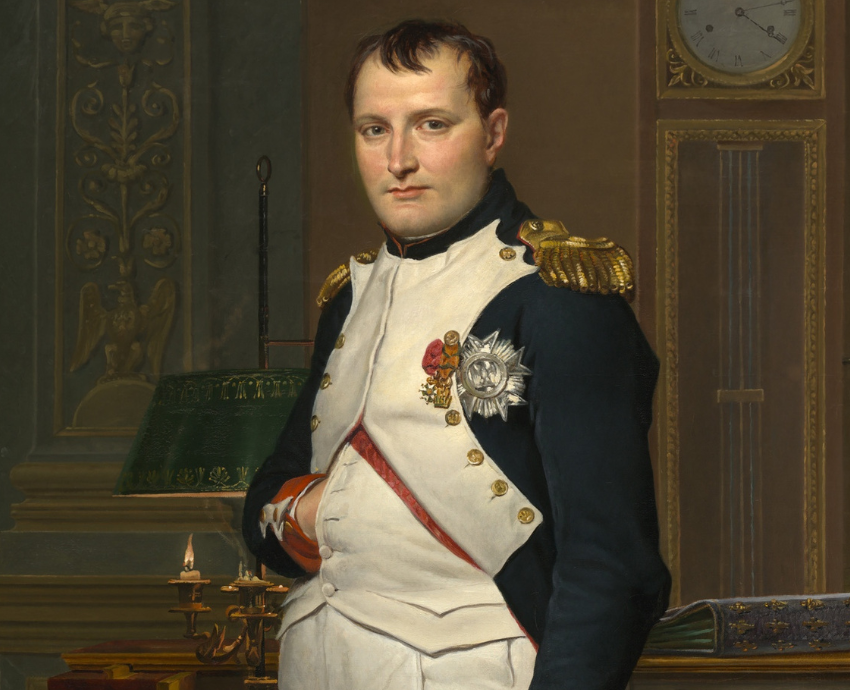
Napoleon
Directed by Ridley Scott
Starring Joaquin Phoenix, Vanessa Kirby, Tahir Rahim, Rupert Everett
In cinemas
“I found the crown of France in the gutter … and I place it atop my own head,” proclaimed Napoleon Bonaparte as he crowned himself Emperor on December 2, 1804.
Director Ridley Scott (Gladiator, Kingdom of Heaven) depicts the rise and fall of Bonaparte (portrayed by Joaquin Phoenix) in his 2023 film, Napoleon.
The French monarchy had been overthrown at the height of the French Revolution, which proclaimed France’s First Republic on September 22, 1792 and executed the deposed King Louis XVI on January 21, 1793.
Scott’s adaptation opens in 1793, with Napoleon witnessing the execution of deposed Queen Marie Antoinette and enjoying his first victory at the Siege of Toulon later that year.
This is where the problems with Scott’s adaptation start.
While the film is popular, grossing $79 million at the Box office so far, many people, especially historians have criticised its lack of historical accuracy — starting with the film’s opening scene.
Napoleon wasn’t actually present at the execution because of his involvement in the five-month long siege. Toulon was key royalist stronghold and Napoleon’s victory there was crucial against the royalist and foreign forces attacking the revolution at the time.
Toulon was also crucial to Napoleon’s rise as it showed his loyalty to the revolutionary government led by Maximilian Robespierre and the Jacobins in 1793‒94. Napoleon’s victory at Toulon and Robespierre’s downfall and execution would begin his rise to power.
Napoleon was initially a close supporter of the most radical faction of the French Revolution, the Jacobin’s, led by Robespierre. He was briefly imprisoned in the aftermath of the July 27 reactionary coup that led to the downfall and execution of Robespierre and his supporters.
However, Napoleon was too valuable to the conservative directory that ruled France from 1795‒99.
Scott’s Napoleon then moves quickly through many of the key moments of Napoleon’s rise and fall between 1795 and 1815.
The film depicts his tumultuous relationship with widowed aristocrat Josephine de Beauharnais, his rise to Emperor in 1804, defeating the Austrians and Prussians at Austerlitz in 1805, the disastrous Russian campaign of 1812 and being deposed by the European powers in 1814.
This eventuates in the 100-day campaign in 1815, where Napoleon returns from exile in Elba only to lead his troops to eventual defeat at the battle of Waterloo at the hands of a British-Prussian alliance led by General Wellington (Rupert Everitt). Napoleon ends his days in exile in the South Atlantic Island of St Helena in 1821.
You don’t get a sense from the film as to why Napoleon betrayed the French Revolution and its republican ideals — by first becoming a dictator in all but name in 1799, Consul for life by 1802 and emperor in 1804.
The latter move allegedly led composer Ludwig van Beethoven to remove Napoleon’s name from a symphony he dedicated to him.
More importantly, key military campaigns such as the 1796‒97 Italian campaign, the 1808‒14 Spanish Peninsula wars and the 1813 Battle of Leipzig are entirely left out of the film.
We also don’t get a sense of why Napoleon was so popular with his troops, such as the great care and attention he took to looking after their wellbeing.
The French Revolution enabled someone like Napoleon to rise to a high position. While in power he instituted many key reforms that were in line with the enlightenment ideals of the French Revolution, such as abolishing feudal distinctions in French-occupied territories, granting civil rights to religious minorities, such as Jews, and instigating a new legal code.
However, millions of lives were lost during the Napoleonic wars, women were stripped of important rights won during the French Revolution and France became an authoritarian police state. It reinstated slavery in 1802, reversing the 1794 French National Assembly’s abolition of slavery in its colonies.
In Saint Domingue (now known as Haiti), slaves inspired by the ideals of the French Revolution rose to regain their freedom. Among them was Toussaint L’Ouverture.
L’Ouverture forged an alliance with the French Republic in 1794. However, when Napoleon sent French forces to recapture the island, L’Ouverture was captured and sent to a prison in the French mountains, where he died in 1803.
A year later Haiti gained its independence, but slavery wasn’t abolished in France’s colonies until the 1848 revolution.
In 1848, Karl Marx and Fredrick Engels declared in the Communist Manifesto: “A spectre is haunting Europe, the spectre of Communism”.
The aristocratic heads of Europe feared the spectre of Jacobinism, which is why they dedicated so many resources to defeating Napoleon. This was despite the fact that Napoleon was an ambitious minor noble who used the revolution to further his ambitions and hated the radical-democratic impulses of the masses at its heart.
Many of the scenes in Scott’s Napoleon are well done, such as Napoleon and Josephine’s civil ceremony wedding (a key reform of the French Revolution), the recreation of the 1804 coronation and many battle scenes. However, Napoleon fails to give a sense of Napoleon the revolutionary and the Napoleonic era with all its contradictions.
Europe’s Reactionary aristocrats hated the fact that a man they saw as nothing but a “Corsican thug” and an “upstart” seized the French crown.
Moreover, despite Napoleon’s betrayals, Scott’s depiction fails to understand how the French revolution inspires so many people in the fight for a better world to this day.